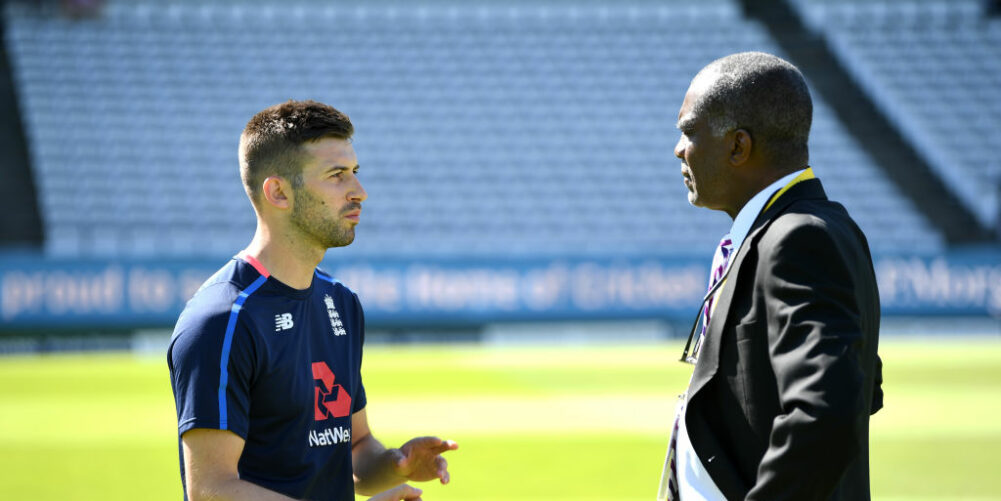(Photo: Getty Images)
Asked recently whether fast bowling is a gift one is born with or something that a person can learn, Michael Holding was emphatic. “I don’t think that that is something that can be taught,” responded the former West Indian spearhead, interviewed on the BBC’s Stumped programme. “You’ve got to have the ability to bowl fast. Then people can work on that and get you to bowl a little bit faster over an extended period of time. You can’t manufacture a fast bowler.”
Correct training and development can contribute, but without having the right attributes at birth, the rest is futile. Holding offers 6ft 7in, powerfully-built professional basketball players as an example. Teach them well and they may be able to bowl, and bowl fast, but the base skill is one that you either have, or have not. If it was all about brute strength and muscular physique, England might do well to call on Chris Tremlett who, according to his social media, now spends his time pumping iron, which has garnered him biceps the breadth of Steven Finn’s chest alone.
This question of nature versus nurture was raised again recently by Matt Prior on the BBC when he accused “too many” professionals of “floating around in county cricket, having a nice life with actually very little ambition to push on.” During his career Prior was notorious for his single-mindedness and hard graft, and no doubt these attributes were important. Still, it’s hard to imagine that the only thing stopping some county pros from swatting Mitchell Starc for sixes is their lack of willpower. Not only did Prior possess great reserves of self-discipline and determination, but his raw skill exceeded most of the competition. Of all the factors needed to succeed, innate sporting ability seems a pretty large one.
This brings us to the problem of England’s chronic lack of fast bowling stock. By Holding’s reasoning, England should be able to produce, at birth, the same number of people capable of sending down rockets of 90 mph as Australia. Arguably more, given their relative populations.
So where does the issue arise? Holding offers a compelling explanation. A lack of freedom; bowlers, especially in Test matches, should not have to worry about conceding runs or having a wayward radar, for they are strike bowlers – unpredictable, dangerous and liable to take a wicket at any time. Holding cites Finn as an example of where this fearlessness has been coached out of him and contrasts Mitchell Starc’s economy (3.18) to Stuart Broad’s (2.69) in the last Ashes. Starc took 22 wickets, Broad just 11, and we know how that ended.
Holding speaks with a vast amount of personal experience, but some historical statistics provide added authority. When Pakistan arrived at Bridgetown in 1977, they faced the imposing West Indian pace attack of Andy Roberts, Joel Garner and Colin Croft, then at the peak of their powers. This entertaining, fluctuating series included a new world record – not for runs scored or wicket hauls, but for the number of extras in an innings.
In the first innings the West Indies sent down 35 extras. In the second, they surpassed it with 68 and thus broke the record. This record then lasted ten years, until Pakistan once again toured the West Indies in 1988. The Caribbean side, by now famed for producing waves of fearsome fast bowlers, broke it again as Messrs Patterson, Ambrose and Walsh helped the visitors with 71 extras. Both matches were won by the West Indies and the record stood for almost twenty further years. It didn’t seem to do them any harm.
Matthew Parris, writing recently on national life expectancy, observed that in all facets of life, “a single big effect is not necessarily the result of a single big cause.” Of course many factors affect England’s bowling; fixture scheduling, wicket preparation, weather, coaching philosophy and injury prevention all play their part, but perhaps we have not given the notion of ‘bowling with freedom’ its due respect.

Ironically England identified that a lack of freedom was impeding their batting almost three years ago. James Anderson on the BBC, recently voiced his dislike of the term ‘playing with freedom’, while simultaneously conceding that England’s ODI batsmen now played this way, with largely the same personnel at the crease. It worked with white ball batting, so why not try applying it to a different discipline, even if it is in a different format?
The concept should not just be applied to fast bowlers; spin bowling, leg spin in particular, is notorious for being one of the hardest cricketing skills to master. It requires either once-in-a-lifetime genius (Shane Warne) or resilient self-believers (Graeme Swann, Nathan Lyon of late) to succeed in international cricket. Successful spinners must withstand years of being pummelled for sixes and mown to cow corner by agricultural heaves. Not every spin bowler has that innate confidence; should that matter more than skill? The way in which a ‘plucky’ Mason Crane was widely lauded following a largely fruitless Ashes debut suggests that it currently does.
Spinners need a structure around them that will encourage them to play with freedom through those challenging developmental years. Hit for two consecutive sixes? No problem if you then have the gumption to toss it up and have your assailant stumped next ball. Adil Rashid, who dominated BBL batting attacks when he played for the Adelaide Strikers under Jason Gillespie, is arguably the only current England bowler who has both that skill and ‘freedom’. No wonder he has little appetite to compete to be in England’s Test side when white ball cricket offers him so much more.
Perhaps Prior’s comments have some truth – perhaps it is nurture, not nature, that is most significant for sporting success. Instead of blaming players for a failure to capitalise on their innate ability through lack of ambition and hard work, maybe it’s time to nurture those players in an environment which allows them to play with real freedom.















